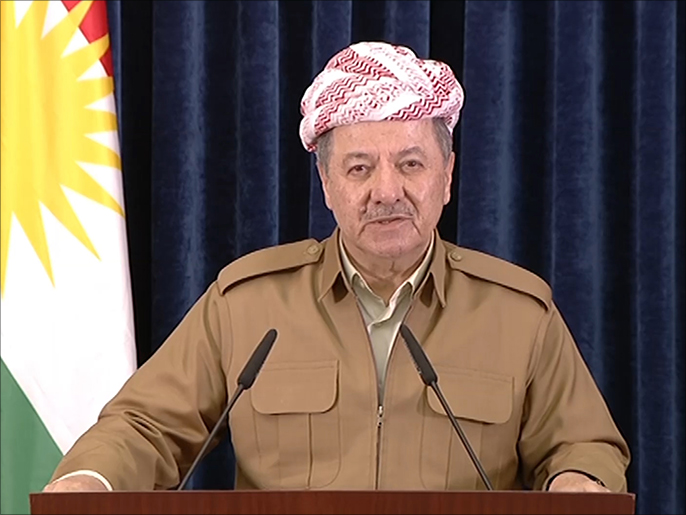Today, Thursday, Iraqi Kurds commemorated the 34th anniversary of what is known as the Anfal campaign, which the forces of the late President Saddam Hussein accuse of perpetrating following the outbreak of an insurgency in the north of the country at the end of the Iran-Iraq war in 1988, which claimed the lives of tens of thousands of Kurds, while the regional government renewed Baghdad's demand to compensate the victims of the operation.
Iraqi President Barham Salih said in a tweet on this occasion, "We remember the Anfal crime that the dictatorship committed against defenseless civilians in Kurdistan. Thousands were displaced and the pure bodies of the victims were hidden in mass graves, as was the case with our people in the center and the south, and their guilt is that they did not accept injustice and oppression." Home to prevent the recurrence of tragedies.
We remember the Anfal crime committed by the dictatorship against defenseless civilians in Kurdistan. Thousands were displaced and the pure bodies of the victims were hidden in mass graves, as did our people in the center and the south, and their fault is that they did not accept injustice and oppression.
Coming together to prevent the recurrence of tragedies, bring justice to the victims and achieve justice is the greatest appreciation for the martyrs pic.twitter.com/C5cVP4qnqP
— Barham Salih (@BarhamSalih) April 14, 2022
The leader of the Kurdistan Democratic Party, Massoud Barzani, said on his Twitter account, "The Anfal campaign launched by the former Iraqi regime President Saddam Hussein against the Kurds, which claimed the lives of tens of thousands of people of different age groups, is one of the most brutal events in the history of the Iraqi state since its founding during the last century." ".
Barzani stressed that "it is the duty of the Iraqi government to compensate for the major crimes committed against the Kurdish people."
The genocidal Anfal campaign is one of the most inhumane episodes of Iraq's history during the last century.
It is imperative and it is a matter of moral responsibility for the Iraqi state to begin the process of reparations to the families of the victims of this heinous crime.
— Masoud Barzani (@masoud_barzani) April 14, 2022
Compensation claims
The President of the Kurdistan Region of Iraq, Nechirvan Barzani, said that “while the Iraqi High Court of Justice approved the “Anfal” campaign as a crime of ethnic genocide, a crime against humanity and a war crime, on this anniversary we call on the Iraqi government to assume a legal and humanitarian duty to compensate the afflicted and the families of the victims, hoping that this will heal part of their wounds. ".
Barzani called on the Iraqi government to assume a legal and humanitarian duty to compensate the afflicted and the families of the victims (Al-Jazeera)
The Prime Minister of the Regional Government, Masrour Barzani, also renewed his call on the Baghdad government to assume its responsibilities in compensating the victims of "Operation Anfal", and said that it must carry out, in accordance with the constitution, its duties and responsibilities in compensating the families of the martyrs, as well as the victims and victims of the Anfal campaigns and other war crimes and genocides committed against The people of Kurdistan.
Barzani said, in a statement, that talking about this process should not be limited to remembrance only, but that utmost efforts should be made to eliminate what he described as the fanatical thought that was behind its perpetration in the majority of Kurdistan regions, which formed a deep wound that does not heal in the Kurdish body and memory. .
Iraqi Kurdish celebrates the 34th anniversary of the Anfal campaign among the graves of the victims (Anatolia)
Campaign details
In 1988, the Iraqi army under Saddam Hussein carried out the so-called Anfal campaign, at the end of the Iran-Iraq war (September 1980-August 1988), following the outbreak of an anti-regime rebellion in the north of the country at that time.
The Iraqi prosecutor said during the trial of the pillars of the regime of Iraqi President Saddam Hussein in this case, that the Anfal campaign launched in 1988 against northern Kurdistan constituted a "genocide", as it led - according to him - to the death of 100,000 Kurds, the destruction of thousands of villages and the displacement of their residents, but Saddam Hussein - who topped the list of defendants in that case - confirmed that it was just a necessary operation to confront a rebellion movement during the war with Iran.
The campaign included 8 major operations, each of which lasted two weeks, and planning began in 1987, two weeks after Saddam Hussein appointed his cousin Ali Hassan al-Majid as head of the Northern Affairs Office of the Revolutionary Command Council, which took over the re-control of the region.
The campaign came in response to the attacks of Kurdish fighters (Peshmerga) who, during the war with Iran, took control of some cities with the support of the Iranian Revolutionary Guards.
Accounts stated that a number of villages were bombed and destroyed with chemical weapons, and testimonies spoke of widespread looting, mass executions, and villages erased from the map.
On May 3, 2011, the Iraqi High Criminal Court considered the Anfal campaign a "crime against humanity and genocide", and convicted Ali Hassan al-Majid, Saddam's defense minister, of overseeing a "chemical attack" launched on the city of Halabja in Sulaymaniyah Governorate (in the north of the country).
Al-Majid denied the accusations against him, and stressed that the Iranian side was the one who used chemical weapons in conjunction with the continuation of the Iran-Iraq war.
The court sentenced Al-Majid to death, and the death sentence was carried out on January 25, 2010.

